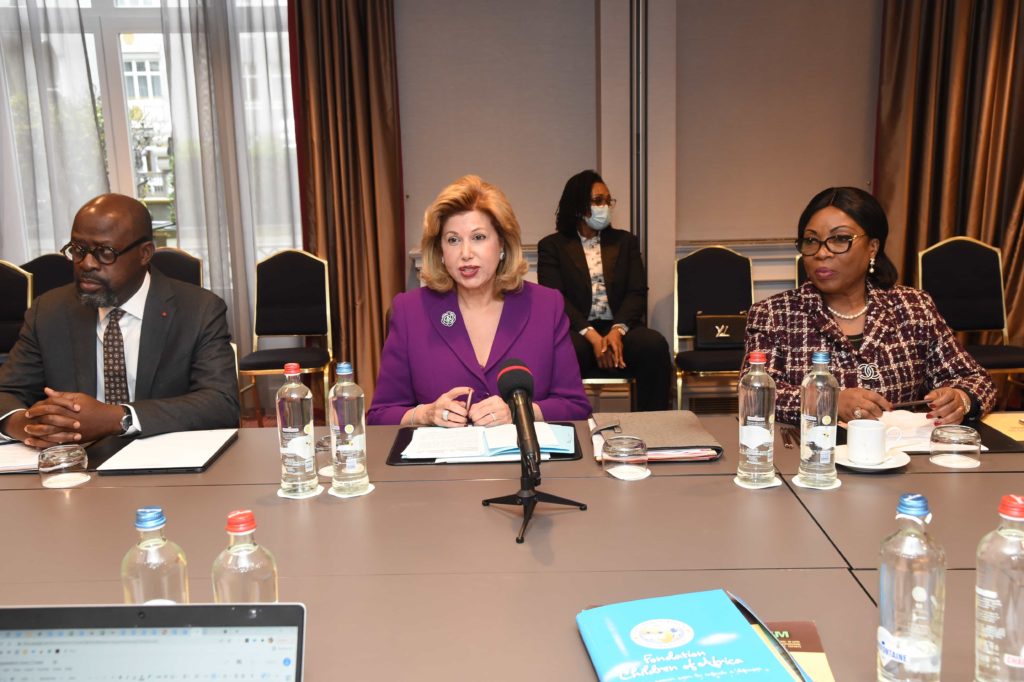Save the children, Solidaridad Network, FERN and Defense For Children International-Belgium, these are the four Belgian civil society organizations that met on Wednesday February 16, 2022, with an Ivorian delegation headed by First Lady Dominique Ouattara, Chairwoman of the National Oversight Committee of actions to fight against trafficking, exploitation and child labor (CNS).
Fighting child labor in Côte d’Ivoire: Mrs. Dominique Ouattara presents the country’s efforts to Belgian civil society

The meeting which took place at the Wiltcher’s Hotel in Brussels, the Belgian capital, witnessed the participation of Mr. Alain-Richard Donwahi, Minister of Water and Forests, Mr. Adama Kamara, Minister of Employment and Social Protection, Chairman of the Inter-ministerial Committee for the Fight against Trafficking, Exploitation and Child Labor (CIM); Mr. Georges Bolamo, Deputy Chief of Staff to the Ivorian Prime Minister; Mrs. Sylvie Patricia Yao, Chief of Staff to the First Lady and Executive Secretary of the National Oversight Committee for the fight against trafficking, exploitation and child labor (CNS); and many other officials.
The discussions started with a presentation of Côte d’Ivoire’s efforts to address child labor by the CNS Chairwoman. “As you know, Côte d’Ivoire is the world’s leading cocoa producer with more than 2.2 million tons produced in 2020, or 45% of world production.
Cocoa provides more than 40% of the country’s export earnings. 2/3 of our production is for the European Union market which is a strategic partner of Côte d’Ivoire.
Ivorian cocoa is cultivated in small family farms and about 6 million people depend on cocoa for their livelihoods, which represents 20% of the Ivorian population.
However, like many other countries, Côte d’Ivoire has been confronted with the thorny issue of child labor.
In response to this situation, my husband President Alassane Ouattara, after assuming office in 2011, decided to raise public awareness especially cocoa farmers on hazardous work “said the Chairwoman of the CNS.
Strengthening the technical and operational capacities of stakeholders involved in the remediation process, improving children’s access to education through the implementation of action plans to ensure prevention, protection of children, prosecution and repression of traffickers as well as coordination and monitoring evaluation have been implemented by Côte d’Ivoire to significantly reduce child trafficking, exploitation and child labor. Despite the numerous challenges, Mrs. Dominique Ouattara wanted to reassure the Belgian civil society that the Government is committed to protect children’s rights. “(…) I would like to add that ending child labor is not an easy task, because for several years we have been experiencing high migration pressure from people fleeing terrorism in neighboring countries. Despite these difficulties, my country and all the stakeholders are making effort every day to protect our children and ensure them with a bright future,” she explained.
According to Mrs. Dominique Outtar, any European Union sanction against the Ivorian cocoa will directly have a negative impact on farmers and their families. In addition, the CNS Chairwoman requested the support of the Belgian civil society in this fight. “We are here today seeking your views and advice in order to address the issue. We ask for your support as well as collaboration to implement our various actions. I have faith that together we can find solutions to ensure the protection of our children and a sustainable cocoa”, said Mrs. Dominique Ouattara.
The Minister of Water and Forests, Alain Donwahi presented Côte d’Ivoire’s new forestry policy aimed at covering 20% of the forest cover loss and the introduction of agroforestry in cocoa farming.
For his part, the Minister of Employment and Social Protection, Adama Camara, reaffirmed the government’s commitment to continue to include child labor among its policy priorities and especially to ensure a better income for cocoa farmers.
The civil society organizations welcomed the First Lady’s initiative and said they were available to support the Ivorian authorities.
They also hoped that this framework for exchange and sharing would be encouraged.